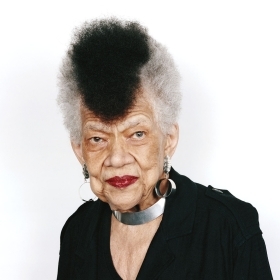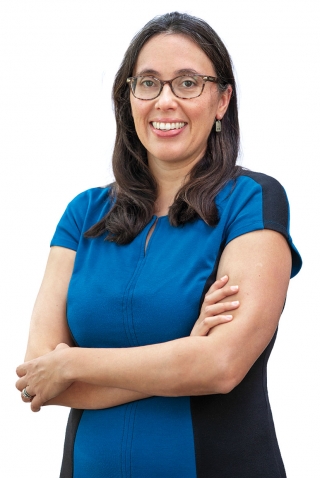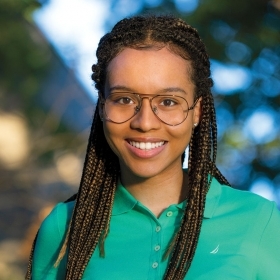Photo by Lisa Abitbol
Professor Petra Rivera-Rideau’s students may have had their semester upended, but they are finding respite in the upbeat rhythms of reggaeton, bachata, and merengue.
Latina/o Popular Music and Identity (AMST 217) isn’t all dance party, though—students are using music to examine serious social issues in the United States, including racism and gender inequality.
Hugely popular reggaeton, for example, started in mostly Black, working class communities in San Juan, Puerto Rico. It’s a story Rivera-Rideau, assistant professor of American studies, knows well, as the author of Remixing Reggaetón: The Cultural Politics of Race in Puerto Rico. Reggaeton was and is party music, but it also started as a vehicle for artists to talk about discrimination and police brutality. Rivera-Rideau’s class has been discussing how the genre is now criticized for abandoning Black communities in Puerto Rico and losing its political edge as it went mainstream.
Lizette Ortega ’22, who is taking the class from home in Houston, says she grew up listening to a lot of music from Latinx communities with her family. She’s a physics and peace and justice studies major but jumped at the chance to take the class. “I was really excited about someone creating space to study [Latinx music] in an academic setting,” she says.
By the second week of the class, Ortega had already deepened her understanding of the music. “I didn’t really know a lot about the beginnings of these genres,” she said. “I honestly didn’t know how much [reggaeton] did and how much it does in connecting Latinidad to Blackness.”
Rivera-Rideau changed the structure of the class to teach it in an intense seven-week term. (The semester was split into two terms during which each student takes two courses.) The course now compares the genres rather than walking through each one separately—a change she feels is helping her students grapple with bigger concepts right away.
One comparison she draws is between bachata and reggaeton. Both genres originated in predominantly Black communities, but bachata came out of the Dominican Republic decades before reggaeton developed in Puerto Rico. Both carried stereotypes of grittiness and hypersexualization, Rivera-Rideau says, while white and upper-class artists in the same genres have been seen as more respectable. Her students wrestled with why two genres from two different places in two different time periods were racialized in the same way.
The reason? “Global systems of anti-Black racism might manifest differently but are rooted in the same global problem,” Rivera-Rideau says. “I felt like the students got that faster in a way because they had that comparative approach.”
After studying race, the class is looking at popular Latinx music genres through a gender lens, and talking about how and why artists have crossed over into the so-called mainstream.
Rivera-Rideau says she was initially disappointed about having to teach online. “I love teaching in person and being with my students,” she said. But she’s managed to make the class sing anyway.
Technology has allowed for online class sessions with breakout groups, and the class stays connected asynchronously through a discussion forum. Rivera-Rideau says her students have been enthusiastic, engaged with the material, and prepared from the get-go.
The format has also opened up opportunities for her class. She’s booked three powerhouse women in the industry to connect to the class remotely: Andre Veloz, a New York bachata artist disrupting a male-dominated genre; Suzy Exposito, a music editor at Rolling Stone; and Leila Cobo, Latin industry lead for Billboard.
For music major Grey Devlin ’22, who wants to go on to study gender and music, the class is an opportunity to have important conversations about what it means for music to be racialized and gendered. “When you talk about music you have to talk about culture, race, socioeconomic status,” Devlin says. “It’s a good reflection of what’s happening in a time and place.”








We ask that those who engage in Wellesley magazine's online community act with honesty, integrity, and respect. (Remember the honor code, alums?) We reserve the right to remove comments by impersonators or comments that are not civil and relevant to the subject at hand. By posting here, you are permitting Wellesley magazine to edit and republish your comment in all media. Please remember that all posts are public.